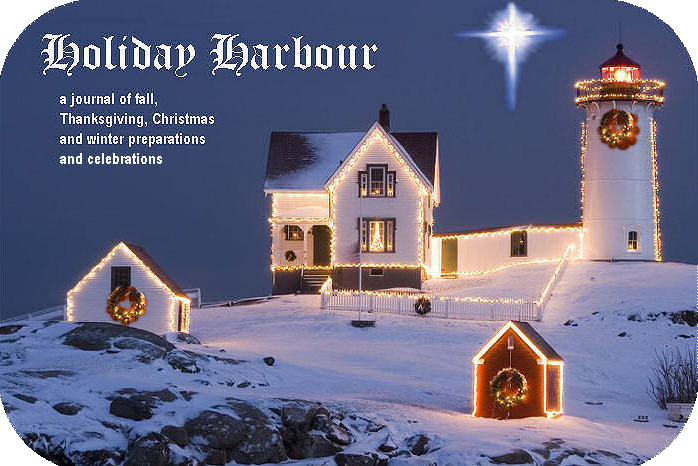This month's books are about having the Christmas you want, not the one you're told you should have.
Unplug the Christmas Machine, Jo Robinson and Jean Coppock Staeheli
The Christmas Survival Book, Alice Slaikeu Lawhead
I like to pull these two books out before the holiday season gets up too much steam to remind me that the Christmas season is what you make it, and not what the advertisers, the magazines, and the media tell you what it's supposed to be.
In its strictest sense, Christmas is about the celebration of the birth of Jesus and the beginnings of Christianity ("Christ's Mass," after all). We really don't know when Jesus was born, but so that it was more easily acceptable to people who were not Christians (in the hope these people might convert), an early Pope attached this feast to the Roman celebration of Saturnalia, a time of the year when the light was dying but was given over to feasting, dancing, and other celebration. Non-Christians in the north called this same celebration "Yule," where we get the word "Yuletide" for a Christmas season synonym. Sound familiar? Sure it does, because that's what the broader celebration of Christmas is today: eating a delicious meal, visiting with friends and family, noise, music, lights (all December holidays, from Christmas to Hanukkah to Kwanzaa to St. Lucy's Day emphasize light in some fashion, since the winter solstice will bring the longest night of the year), alcoholic beverages, and most of all gifts, which was a holdover custom from the Romans, although they gave them at the new year.
Early Christians actually disowned the holiday. "Christ should not have his birth celebrated as if he is some King Pharaoh!" was one of the comments. Later Christians complained bitterly about its licentiousness. It was pretty much a holiday that allowed too many liberties, like cross dressing, eating and drinking to excess, and clandestine sexual activity. You might decry them as being a bunch of Puritans, but these Christmas revelers did things that would be considered illegal today. For instance, what we think of as the quaint, sweet tradition of caroling was originally carried out by young men who expected a shot of something alcoholic at each house. Even in those days when everyone drank "small beer," even small children, because the water was so polluted, and all became accustomed to some alcohol in their systems, after several home visits these young men would be dead drunk. If they knocked on your door and you chose not to answer, or chose not to give them a libation, they might break in, break your windows, or otherwise vandalize your house. Women or anyone who the young men thought might have money on their person were not safe to travel alone. It was only until Christmas morphed into the child-centered gift-giving celebration we claim it is today that these behaviors were checked (and even then old habits died hard: long into the early 20th century it was still common for young men to get dead drunk on New Year's Eve, to the point that some of them passed out and froze to death in chillier climes).
Today there's more pressure than ever to have "a perfect Christmas." This means you must entertain flawlessly, with beautiful table settings and expensive food; buy your spouse/significant other and children costly gifts to show that you love them; stuff yourself with every goodie known to man, foodwise and alcohol wise, to properly appreciate the season; and generally spend lots of money, even if you have to go into debt to do so.
These two books remind you that all that is whitewash to sell products, that Christmas isn't about $2000 tennis bracelets, matching SUVs, drinking yourself silly on expensive champagne, stuffing rich food into yourself. They also remind you that fictional stories always require a happy ending, but that Christmas won't fix the problems you have with your life: little Christmas elves or Christmas Spirit aren't going to make your Dad stop drinking, your Mom criticizing your housekeeping; it won't bring back your estranged sibling or spouse, and it can't cheat death. Those things only happen in movies or in the few miracles we're allowed.
Instead the authors talk about having a Christmas that suits you, with no ideal to live up to. You can have a lively noisy holiday with family or friends, or you can celebrate with one person, or alone. You can give fancy gifts if you can afford it, or what your budget will allow, or no gift at all. There's no requirement that Christmas live up to magazine ads, television commercials, and Hallmark films. Nor is there any requirement that Christmas stop dead at 11:59 on December 25, leaving you to cram all your Christmas activities into the short season between Thanksgiving and the big day; go ahead, do as your ancestors did and celebrate all the way to Epiphany (just ignore all those Valentines Day cards and candy that suddenly appeared on the 26th)!
While both books make the same point and offer good suggestions, I like having both and suggest both be procured if the subject interests you. The Lawhead book focuses a little bit more on the Christian celebration, but there is no proselytizing and the church suggestions can just as easily be used for organization, club, or work situations. Both books were published in the early 1990s, so there's no reference to internet sites, but the basics can easily be looked up online. I especially enjoy Lawhead's prologue "What is Christmas?" which starkly compares the idealized holiday we get from the media versus its real-life counterpart.
And both include the same message: Slow down. Savor. As we would say today, Be Mindful. Enjoy.




